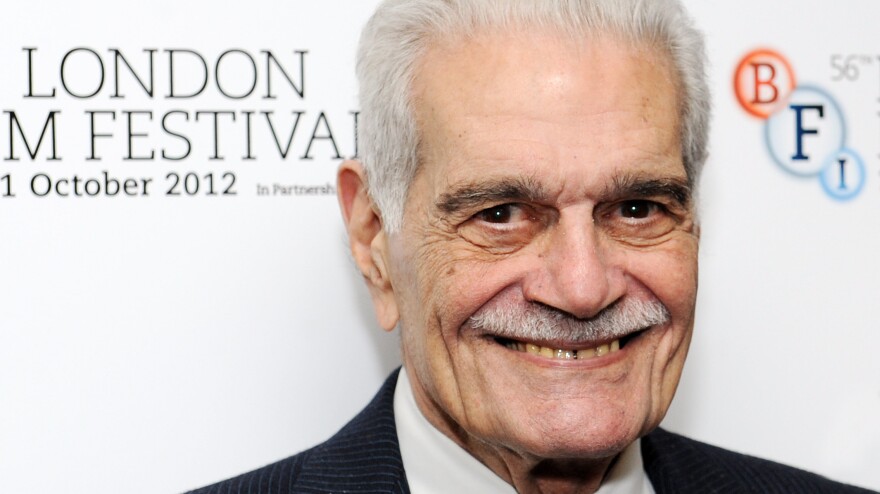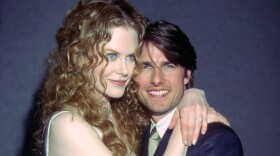In one of the greatest movies of all time, a World War I-era Englishman played by Peter O'Toole stops with his Arab guide at a well in the desert. As they drink, they look into the distance and see a lone figure in black, galloping toward them on a camel. The Arab man recognizes him and draws a gun. The lone figure brings him down with a single musket shot. Now that's an entrance.
The man on the camel was Omar Sharif as Sherif Ali.
Lawrence of Arabiahit screens 50 years ago this month, and a new, boxed Blu-ray edition, complete with a book that's big enough to be a holiday cheese tray, is out this season.
The film confirmed David Lean as one of the great directors and starred a whole company of British actors, including Alec Guinness as King Faisal and Jack Hawkins as a haughty British officer. It also introduced Sharif to world audiences. The actor joins NPR's Scott Simon to talk about his first hit film.
Interview Highlights
On what made David Lean such a good director

"He was a brilliant person. He didn't think of anything except films. He did not think of theater. He did not think of anything else in his life. He didn't like actors; he hated actors, but he loved me. I don't know why because I didn't know myself what I was going to do, and the first shot I had to make, I spent the whole night to practice it for the next day — my first shot in the film. And he knew about this, and he loved me for it."
On the mustache he wore in the film
"They sent me a plane in Egypt to bring me in the desert, and the plane came down and there was one man [Lean] standing in the desert, and they stopped the plane in front of him. I came down from the plane, and he didn't speak to me. He went around my head, to see the profiles, to see what kind of hair I have, what face I have. And then he said to me, 'Omar, come, I have to speak to you.' We went to the place where they do dressing and things like that. He sat with me, he said, 'Omar, what you think about a mustache? A black mustache. That would be good, wouldn't it, Omar?' I always said, 'Yes, sir. Yes, it's wonderful.' I came from Egypt. I couldn't believe myself talking to this brilliant, extraordinarily good director."
On his friendship with Peter O'Toole
"We were complete brothers. We slept in the same tent. We ate the same food. ... At night, we put our table outside the tent — the sky was wonderful at night, the stars were wonderful — we just sat there and talked and had some whiskey. We used to like having our whiskey at night. And we became very close friends."
On making a movie in a desert
"It wasn't difficult for me at all. On the other hand, I was rather happy to be in the desert. I was rather happy not to have women, I don't know why. I was married then. My wife, you know, wanted to see me all the time. She tried to come one or two times in the desert, but she wasn't allowed to come there. But I enjoyed my one year — it took one year of shooting this film in the desert — and I was happy being with fellows, being with the brilliant director, brilliant actors with me and all that. It was really wonderful for me. It was a great lesson for me to become an actor."
On what he expected from the film
"I didn't at all think that anyone would even look at this film. It's three hours and 40 minutes, or something like that, and Peter O'Toole and myself were unknown, both of us, when we made the film. And there was just secondary actors who were well-known and all that, but you couldn't believe that the people would go and sit for three hours and 40 minutes with no women, with no loving, with no action — the action was very little in that film. All you did is get onto the camel and go around in the desert, that's all."
On his birth name
"My name was Michael. Michael, it was. My mother and my father were Catholics. ... First I went to a school where the priests were French, and then after, when I was 9 or 8 years old, I went to an English school, thank God. And there was a theater there and that's how I started to become an actor."
Copyright 2020 NPR. To see more, visit https://www.npr.org. 9(MDAxNDQ2NDAxMDEyNzU2NzM2ODA3ZGI1ZA001))





